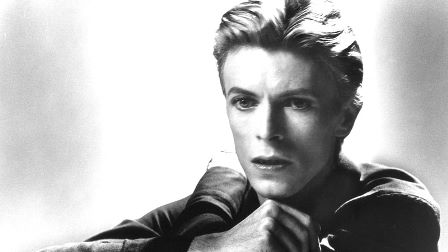Fully settled in Berlin, with a work system established and in a far better place, physically and emotionally, than he’d been in years, David Bowie completed the second LP in his Berlin Trilogy quickly and efficiently. He began right after wrapping Lust for Life, his second collaborative home run with Iggy Pop. Bowie co-conspirator Brian Eno had also been on creative fire in Germany. He’d just completed work with “kosmische musik” pioneers Cluster, plus material for his forthcoming solo album, Before and After Science. Then he got down to reuniting with Bowie for Heroes.
The album was recorded at Hansa Studios, a grim, cavernous repurposed Weimar-era ballroom that once hosted Nazi-party fetes and whose windows looked out on soldiers patrolling the Berlin Wall. The city itself shaped the album profoundly. Its instrumentals were reflections of Berlin’s multiculturalism: Bowie played a Japanese koto on “Moss Garden” and a Middle Eastern–sounding sax melody on “Neuköln.” “V-2 Schneider” references krautrock godfathers Kraftwerk.
[vsw id=”LBeD_9L08OU” source=”youtube” width=”465″ height=”384″ autoplay=”no”]
The Berlin influence came through most explicitly in the theme of Heroes‘ uplifting title track. In what is arguably his greatest vocal performance, Bowie tells a story of determined lovers meeting in the shadow of the Berlin Wall (a scenario inspired, it turned out, by Bowie’s glimpse of Tony Visconti and his girlfriend embracing). The narrative is borne by Robert Fripp’s otherworldly guitar work. “I went into the large control room with a Les Paul around my neck and a large Marshall stack, and the guitar sound is produced simply by feedback,” Fripp recalled. Eno claims he knew “Heroes” would be a great song “from the very first moment those guys started playing it.” Recording his vocals after the music had been laid down, Bowie testified that “Fripp’s plaintive guitar cry really triggered something emotive in me.”
The world agreed: It wasn’t a hit, but “Heroes” may be Bowie’s most admired song. When asked why it’s had such continuing resonance, Fripp responded simply, “Because David was speaking to what is highest in all of us.”
Michael Ochs

